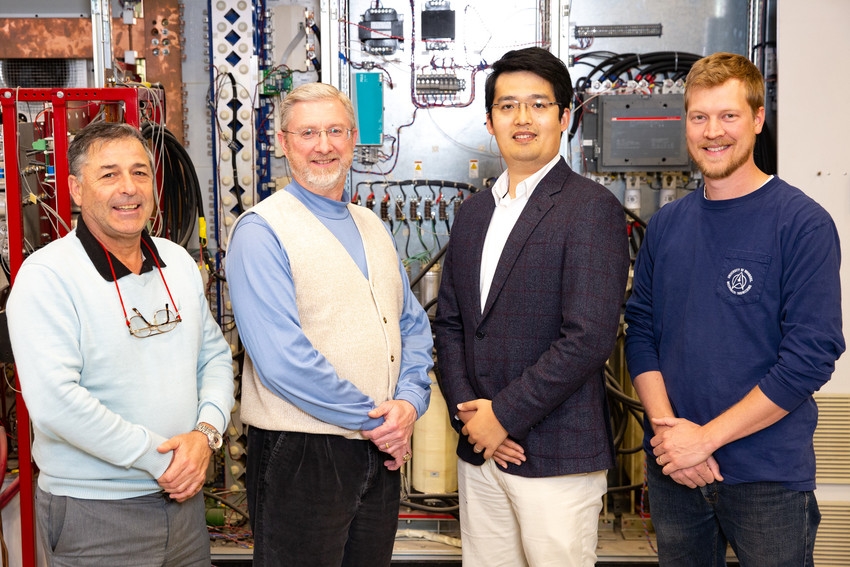FAYETTEVILLE, Ark. – Yue Zhao, assistant professor of electrical engineering at the University of Arkansas, has been awarded $3.4 million to advance power electronics research on the nation’s electric grid. The award includes $2,765,138 from the U.S. Department of Energy Solar Energy Technologies Office and $713,853 in matching funds from university and industry partners.
The funding will enable Zhao’s team to continue developing a high-density, 300-kilowatt, silicon-carbide solar inverter, a critical power electronic device to link solar power arrays to the national power grid. Zhao’s technology is intended to lower the cost of electricity produced by photovoltaic farms.
“Working with cutting-edge, silicon-carbide power electronics, our research team uses a holistic design approach to develop a solar inverter that will achieve higher efficiency and power density, an extended service life and lower long-term costs,” Zhao said.
Solar power arrays produce direct current, or DC; solar inverters convert direct current into the standard medium voltage level of alternating current, or AC, the type of power delivered to the grid. In current systems, bulky step-up transformers are needed to increase AC voltage from low to medium before transferring it to the grid.
The design of Zhao’s solar inverter proposes a new circuit capable of generating AC directly at medium voltage, eliminating the need for a transformer. This innovation significantly increases the volumetric power density of the device, while decreasing its size and reducing installation and maintenance costs.
The U.S. Department of Energy expects to cut the cost of solar electricity by an additional 50 percent by 2030 to enable greater adoption of solar energy. Aligned with this goal, Zhao’s research may lead to the development of a commercial-scale, silicon-carbide solar inverter system. If successful, the power density of the inverter will be 10 times greater than current technology, and the cost of the inverter system will be reduced by 50 percent.
Zhao was selected as a part of the Solar Energy Technologies Office’s Advanced Power Electronics Design for Solar Applications funding program, which aims to develop new technology to improve devices that serve as an interface between solar photovoltaic arrays and the electric power grid. These devices will enhance the reliability and resiliency of the nation’s electric grid.
Zhao’s team is developing the solar inverter at the U of A’s National Center for Reliable Electric Power Transmission, a 6-megawatt power electronics testing facility at the Arkansas Research and Technology Park in Fayetteville. Researchers at the center work with silicon carbide, a powerful semiconductor material, to build power electronics devices for many applications.
“We are very fortunate to have built a strong power electronics program with the support of U of A administration,” Zhao said. “This award reflects the competitiveness of our program and the great team we have been able to assemble.”
The U of A research team members are Juan Balda, University Professor of electrical engineering; Alan Mantooth, Distinguished Professor of electrical engineering; and David Huitink, assistant professor of mechanical engineering. Industry partners include Cree Fayetteville, Eaton Corporation and NextWatt LLC.
About the Solar Energy Technologies Office
The U.S. Department of Energy Solar Energy Technologies Office supports early-stage research and development to improve the affordability, reliability, and performance of solar technologies on the grid. Learn more at energy.gov/solar-office.
About the University of Arkansas: The University of Arkansas provides an internationally competitive education for undergraduate and graduate students in more than 200 academic programs. The university contributes new knowledge, economic development, basic and applied research, and creative activity while also providing service to academic and professional disciplines. The Carnegie Foundation classifies the University of Arkansas among only 2 percent of universities in America that have the highest level of research activity. U.S. News & World Report ranks the University of Arkansas among its top American public research universities. Founded in 1871, the University of Arkansas comprises 10 colleges and schools and maintains a low student-to-faculty ratio that promotes personal attention and close mentoring.
Topics
Contacts
Yue Zhao, assistant professor, electrical engineering
College of Engineering
479-575-4246,
Matt McGowan, science and research communications officer
University Relations
479-575-4246,
